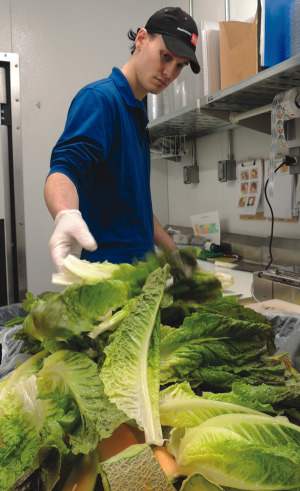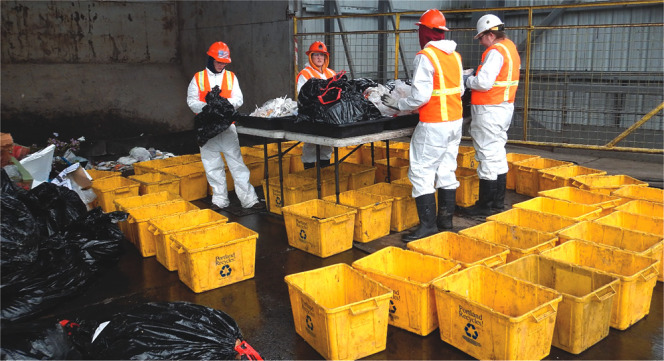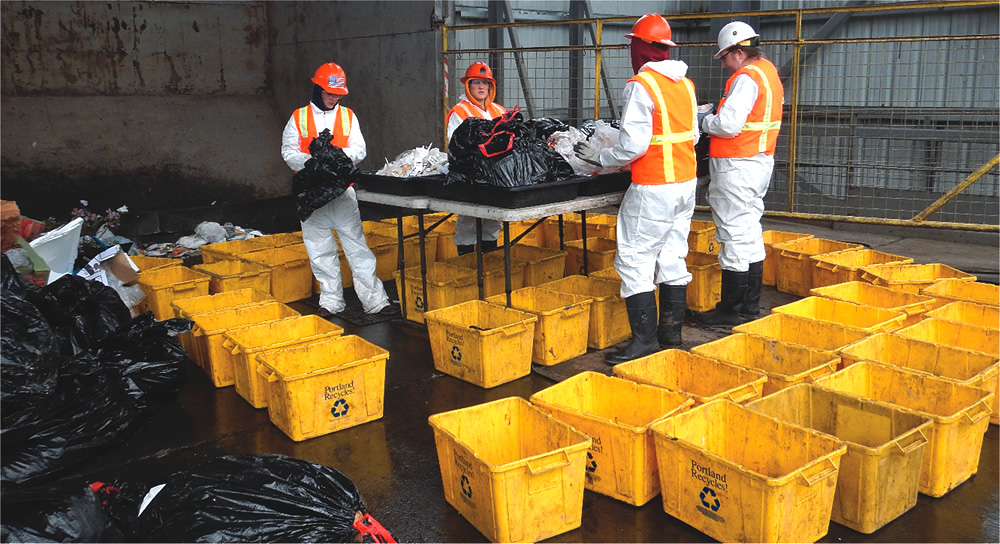Community Environmental Services, part of Portland State University, trains and employs students to offer zero waste management services to companies, institutions and public agencies.
Neil Seldman
BioCycle November 2014

CES works in the private sector with clients such as supermarkets to establish a baseline for material flow and then deliver specific recommendations for reducing waste.
The movement for zero waste in the U.S. has literally exploded in the last few years in both theory and practice. Scores of communities have resolved to start on the pathway to zero — defined as reducing waste generated by 90 percent or more. Cities taking strong steps to achieve this goal within the next decade include Austin (Texas), San Francisco and Los Angeles. Elsewhere, Alachua County, Florida, Portland, Oregon and Seattle have implemented zero waste (ZW) programs without formally announcing a ZW goal. The learning curve for cities and counties that may follow has been made easier by new resources such as the Zero Waste Business Plan adopted by the Resource Recovery Department in Austin, and the statements on Extended Producer Responsibility issued by the Global Recycling Council of the California Resource Recovery Association (CRRA) and the Zero Waste International Association. Paul Connett’s recently published book, The Zero Waste Solution, is the newest asset now available for zero waste planners and advocates.
Two guiding principles of ZW that emerge from recent experience are clear:
• The need to use colleges and universities to inculcate the values, concepts and practices of ZW while students are under the stewardship of an advanced education system.
• The corollary is preparation of students in high school and college for jobs and careers in management of discarded resources in public and private facilities.
In the last few years, CRRA, under a grant from the federal Department of Labor, has funded state accredited curricula in sustainable resource management at Irvine Valley, Santa Monica and Golden West Colleges. Five hundred students were trained, 250 of whom have been placed in full time jobs, demonstrating demand in the economy for a work force that knows how to reduce waste and increase revenue from resource management.
Training Model
Community Environmental Services (CES), a nonprofit research and consulting entity at Portland State University’s College of Urban and Public Affairs, in Portland, Oregon, has been applying both of these core ZW principles since 1989. Eric Crum is the director of CES, which consists of four managers and nearly thirty students. CES employs undergraduate, graduate and doctoral students to offer high quality technical assistance and research services to businesses, institutions and government agencies in the region. This provides students, who are paid (wages range from $10.50 to $20/hour) as well as receive academic credits, the opportunity to apply their academic work in real world settings.
Working in the field educates students about topics such as behavioral change psychology associated with ZW initiatives. By observing behavior change techniques that have proven effective with real people in a business or community setting, students are better prepared to implement similar programs after graduating. “The feedback loops from what’s happening ‘in the field’ are simply so much tighter [compared to in a textbook],” notes Nate Forst, Research and Development Manager for the program.
Initiated under the tenure of PSU Professor Barry Messer, CES’ first project was a contract with Portland’s Metro Regional Council of Governments and the City of Portland to design and implement recycling education and collection of materials at multifamily apartment units in several Portland neighborhoods. CES, Portland Metro and the City of Portland have partnered on numerous projects ever since.
Over time, the scope of CES services has expanded to include a multitude of offerings, including in-depth technical assistance, data collection and analysis, outreach strategies encompassing education, social behavior change and public awareness, and specialized sustainability training. Most recently, CES expanded its services to also include complete supply chain purchasing analysis and carbon footprinting. The CES team has conducted over 300 material assessments for private businesses and public agencies. These assessments focus solely on the material flow that moves through a business or similar organization, including all recyclables, landfill-bound waste, compostable material, etc. Because the composition and value associated with each material is individually broken down in detail, clients can optimize materials recovery and reduce costs. CES is also beginning to work with CLEAResult, a national energy efficiency firm, on pilot testing the energy efficiency benefits of certain insulation improvements.

Material assessments are integral to identifying all recyclables, landfill-bound waste and compostable organics. The value and composition of each material is broken down in detail in order to optimize recovery and reduce costs.
In each area of focus, students gain more and more depth and scope of skills, preparing them for careers in resource management, consulting and policy. Most students are drawn from PSU’s urban studies program, but CES’ reach attracts students from a wide range of disciplines — business, geography, architecture, environmental management, engineering, leadership in sustainability education, and real estate development. The market demand for this trained workforce continues to be robust, offering potential employers an additional skill set that traditional degrees do not provide. According to employer feedback, CES alumni have a keen ability to isolate problems via target research and data collection, then “connect the dots” to identify a solution and ensure continuous, sustainable improvement, explains Forst.
Productive Projects
Starting in 2003, CES students have been embedded at the Portland International Airport as part of the Port Technical Assistance Program (PTAP). The PTAP team has focused on materials management and waste minimization for all Port facilities, with emphasis on the airport infrastructure. The partnership between CES and the Port of Portland has led to development and implementation of sustainability initiatives and best practices regarding airline waste management, including large-scale food waste diversion, and specialized liquid waste diversion.
The Port of Portland liquid collection stations are large, stainless steel containers on wheels. The stations allow passengers to dump the contents of their drink bottles just before and while in the security line. When stations are filled, they are rolled to a janitor’s closet to be emptied into a sanitary sewer. The Port of Portland estimates that in the first year of operation, the liquid collection station offset operational costs by $30,000, primarily a result of reduction in janitorial labor costs. The original intent for the liquid collection program, removing contamination (bottles filled with liquids) from the commingled recycling stream, was also achieved. CES staff work directly with PDX service providers to track and collect the analog data on liquid diversion in gallons serviced on a regular basis. Similar liquid collection stations have been implemented at many other airports across the U.S. The PTAP program continues to improve processes, reduce waste hauling expenses, and advance materials management.
Similarly, CES has worked with the City of Portland on numerous projects to increase participation in recycling, collect and analyze data, develop pilot projects, and implement/evaluate waste minimization programs. In 2010, when the City of Portland piloted its Portland Composts! program, it utilized CES to help roll out the residential food waste collection system.
Recently, CES has also seen significant growth in demand from the private sector including new clients such as Whole Foods, Nike, Daimler North America, IKEA, CH2M Hill, Marriott and Double Tree hotels — all seeking material assessments and/or technical assistance. The goal of CES material assessments is to establish a baseline for material flow and then deliver specific recommendations for reducing waste. A subsequent assessment (conducted after time lapse) then indicates whether improvements have been attained. A new baseline is then set and additional steps can be taken to further improve the system. This methodology is based on the ISO Environmental Management Systems (EMS) standards, which supports a continuous improvement model.
Additionally, as major grocery chains look to change the culture of their companies at the management, worker, and customer levels, CES is able to offer detailed material assessment analyses to help strengthen the economic, environmental, and social case for these improvements. Grocery chains, such as Whole Foods and New Seasons Market (a Portland-based grocery chain which posted an impressive 92% landfill diversion rate) have been better equpped to make continuous programmatic improvements and communicate their internal successes by partnering with CES.
Going forward, CES is expanding into upstream analysis of product and service procurement, as the majority of carbon impact associated with materials management (over 90 percent) occurs prior to disposal. To help improve materials management practices further up the supply chain, CES has begun using an Oregon-specific consumption based economic input model, developed by David Allaway of Oregon Department of Environmental Quality, to provide in-depth carbon emission intensities of the individual products that businesses and Oregonians consume every day.
As CES looks to the future, one area of development will be working with other colleges and universities seeking to replicate the CES model and skills/career development opportunities for students interested in all aspects of an emerging zero waste economy. Combining real-world job experience and a livable wage for students with research-into-action opportunities presents a unique win-win for universities and businesses across the country.
Neil Seldman is a cofounder of the Institute For Local Self-Reliance (www.ilsr.org).













